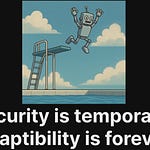(Like this article? Read more Wednesday Wisdom! No time to read? No worries! This article is also available as a podcast).
Many years ago, the Dutch company that I co-founded was making good money teaching Unix courses for the education centers of Hewlett-Packard, Sun, and Digital. During one of our yearly company strategy sessions, we were wondering if that was a smart thing to do. Yes, we were making good money. Yes, there was healthy demand. Yes, we had done it so often that we had become quite good at it. Yes, most courses required almost no preparation time anymore. But: Was it a smart thing to do, giving away our hard-earned knowledge for the discounted rate of 175 guilders per hour?
We imagined ourselves sitting in front of a potential customer for a consulting gig and then being faced with a competitor that we had trained in one of our classes. How silly would we feel if we would lose out to this competitor? Eventually, we settled on the thought that we would probably be able to convince the customer to choose us over the competitor using the slogan: “We taught them everything they know” and hoping that the customer would be sensitive to that. In fact, we never really considered giving up the lucrative education business because it was just too much easy money.
The members of our profession are a very cognitive lot and we therefore place extraordinary value on knowing things. I myself write regularly about the importance of understanding everything that goes on in the computer, right down to the wire. And surely, a good education and lots of knowledge are important, but there is one thing that is importanter: Knowing how to get stuff done. No amount of knowledge will make you useful to the organization if you haven’t mastered the art of getting stuff done.
Of course it is hard to get anything done if you don’t have at least a modicum of the right knowledge, but I will take a co-worker who knows how to use the (perhaps limited) knowledge they have effectively, over one who really knows it all, but does not know how to employ these skills to “move the needle”. On top of that, expecting your superior knowledge to get you hired and employed is a bad bet in a world where there is really no secret knowledge anymore. In the olden days, an important reason to hire someone was because they had knowledge that they had built up over years of having access to computers and information that were only available to a handful of people. These days, computers and information are basically free. Sure, it still takes time to acquire knowledge, but there is tons of competition out there because everyone has excellent access to information. Just having “The Knowledge” is not enough anymore. You need to be able to apply it to help the bottom line.
I have worked with many people who had more than adequate knowledge but who were lacking in the “getting stuff done” department. This typically shows by you never knowing what you are going to get from them and by when. Their subject matter knowledge and skills might be fine, but they would lack many practical work skills.
One of the most essential parts of getting things done is working from a plan of sorts. All work you do is part of a bigger story that connects to the work that other people are doing. To make sure the different parts connect, everyone needs to know exactly what will be done by when. Planning is surely the hardest part of most IT projects, but it is essential nonetheless. A useful aspect of any plan is that it helps you prioritize what you need to be working on and what exactly you are going to build. If time is variable and requirements are fixed, there is never any urgency to anything, and that means that the third dimension (typically: money) will go to infinity. Professional life is a continuous stream of trade-off decisions and these trade-offs all need to be made in service of getting stuff done.
A common aspect of people who cannot get stuff done is that they are frequently blocked. This is a very counterproductive trait and it is part of the set of work behaviors I am looking for when considering promotions. People who aspire to be senior “anything” (in the traditional meaning of “senior”, hence not meaning: Recently graduated from college) should rarely be blocked and staff “anything” should never be blocked. Quite often, unblocking yourself is hard because it requires you to do uncomfortable things, like talking to people, influencing another team’s plans, or just asking for help. Many of us work with computers because we don’t particularly enjoy working with people, but it turns out that in order to get anything done, you mostly need to work with people! It may surprise you, but I myself have an unhealthy fear of talking to people, which I need to overcome on a daily basis in order to get stuff done.
One of the problems with “getting stuff done” is that we haven’t at all figured out how to interview for it. In recent years, many interview panels that I have been on featured a “technical deep dive” interview in which the candidate walks the interviewer through a sufficiently complicated and large technical project in which they played a key role. The interviewer then gets to ask questions about the technology (knowledge!) and about what the candidate exactly did in this project. Were they ever blocked? What did they do? Did they make the plan? How did that go? Did they make difficult trade-off decisions? How did they do that? And how did it turn out?
Technical deep dive interviews are fun to do, but it is incredibly hard to get good signal out of them, unless you really go for the jugular as an interviewer by figuring out the process behind the project, imaging what could have gone wrong, and then asking the candidate hard questions about their involvement. But even then, it is really hard to fathom if this candidate is any good at getting stuff done. Unless there are bright red flags during the interview (which is rare), the most common conclusion is “seems fine”, which as far as hiring decisions go is a crappy signal. You really need to be working with someone for a while to figure out if they can get stuff done.
An essential part of getting stuff done is (knowingly) running the risk of making mistakes.
My dear old parents ran a small business and they had a wisdom tile hanging on the wall in their office that said: “The man who decides and gets it wrong, brings in more money than the perfectionist, who really knew it all, but fails to make the connection.”
It sounds better in Dutch because it rhymes: “De man die beslist en zich weleens vergist, brengt meer geld in de kist dan de perfectionist, die het weliswaar wist, maar de aansluiting mist.”
Working within a plan often requires making trade-offs and doing some things in a “quick and dirty way" that is good enough for now and that enables you to meet the deadline. When doing that, there is always the chance that you are getting it wrong. The fear of getting it wrong leads to behaviors that come down to taking more time and thereby busting the plan and thus not getting stuff done. One of the hard things to overcome here is that some organizations are not tolerant of mistakes and these organizations typically do not get much stuff done and, more importantly, do not improve. If you punish people for making mistakes, their natural defense mechanism will be to not do anything at all (if they can get away with it) or making sure that they only sign up for things they know they can do (with a considerable safety margin). There is a lot of research that shows that organizations that tolerate mistakes move faster, improve, and get more stuff done.
This is where knowledge comes back into the picture. More knowledge and more experience allows you to make better trade-off decisions and to do more in the time allotted to the task. I will say though that, from my experience, if people are not getting a lot done, it is rarely because of a knowledge deficiency. There are always other factors that are more important. Fortunately, there are entire airport bookstore shelves dedicated to books on how to get stuff done, like “Atomic Habits” and “Execution: The discipline of getting things done”.
Disclaimer: I have not read any of these books and I suspect that most could be easily summarized in fifteen minutes.
The books might be mostly obvious, but I do think it is worthwhile to regularly review the way you work and if there is anything that can be done to make you work more effectively.
These changes do not have to be huge. What I am asking of you is not a wholesale review of how you work and then a program of massive change. A continuing stream of small changes usually works much better. One of the small changes that I started making recently is that whenever I promise someone to do something, I immediately give a due date. I found this to work very well for the myriad of small deliverables that are part of every person’s working life, like writing a document, the rollout of some new configuration file, or a fix to some outstanding problem. By immediately signing up for a due date I make everyone’s life easier and I commit myself to delivering the promised result by that date. As a result, I get more stuff done.
And, at the end of the day, getting stuff done is what we get paid for.












